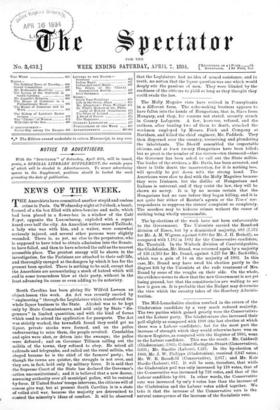'South Carolina has been giving Sir Wilfrid Lawson an oPoject-lesson
this week. An Act was recently carried by " engineering " through the Legislature which transferred the whole liquor business to the State. Alcohol was to be kept only by State Commissioners, and sold only by State " dis- )pensers " in limited quantities, and with the kind of forms eVhich used to attend the application for passports. The Act -was strictly worked, the townsfolk found they could get no liquor, private stocks were formed, and on the police endeavouring to seize them, the people revolted. Constables and spies were shot, or driven into the swamps; the police 'were defeated ; and on Governor Tillman calling out the 'militia of the towns, they refused to obey. He seized all 'railroads and telegraphs, and called out the rural militia, who ebeyed because he is the chief of the farmers' party ; but 'though the towns are quieter, the struggle is not over, and 'they are, in fact, held only by military force. It is said that ;the Supreme Court of the State has declared the Governor's -action unconstitutional; and it is believed that a new decree, 'assuming authority over all municipal police, will be resisted by force. If United States' troops intervene, the citizens will of -course give way, but at present South Carolina is in a state of veiled civil war, because the majority are determined to control the minority's ideas of comfort. It will be observed that the Legislature had no idea of armed resistance, and in truth, no notion that the liquor question was one which would deeply stir the passions of men. They were blinded by the readiness of the citizens to yield so long as they thought they could evade the law.






































